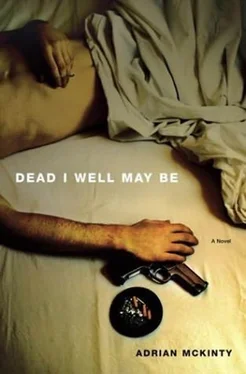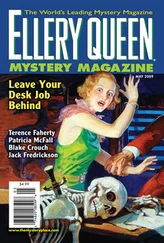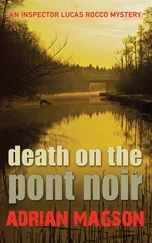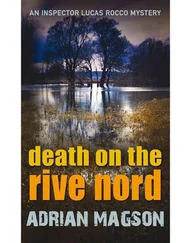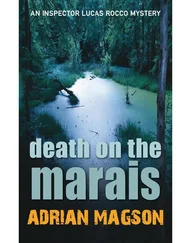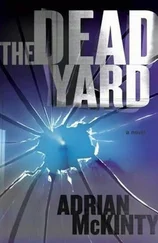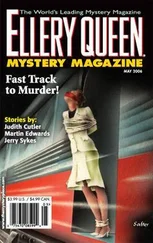Aye, well, save it for the tough guys of Crossmaglen, Scotchy. You’re not impressing anyone here, Fergal says.
Aye, well, when you did ever impress anyone, ever?
I got us out of the fucking lock.
Aye, and what good is it?
What have you done apart from fuck us up in Mexico with your bollocks? Fergal says, at breaking point.
Now you listen, boy, Scotchy says with menace.
No, you listen.
Let me fucking tell you one or two things.
They start pushing one another. I close my eyes to escape it. I put my hands over my ears.
You fucking can’t tell me anything, Scotchy, you have to know something first.
You wee fuck, I was fucking fucks like fucking you before you were born.
Aye, Scotchy, so you say, and you can…
I drift out. I can’t hear anymore. It’s morning and the show’ll come on soon. I lean back and look at the rivers and the towns and the canals. There’s a railway I haven’t noticed before. It connects two of the larger provincial cities on the left continent. Even with its water shortage and irrigation problems it still seems the most technologically advanced of the two kingdoms. There’s a new invasion plan that will break the war wide open. The war minister looks at his minutes and notes that this scheme is coming along nicely; that railway line will help. A feint to the south and then a rapid movement of troops to the north and across the Great Ravine. The window continent’s forces will still be stuck down in the south. They won’t be able to deploy fast enough. They’ll be outflanked. The whole northern side of the window continent will be captured before they can do anything about it. Unless they can retreat, draw the army back to the funnel cobwebs, aye, into the Pripet Marshes, into Siberia. Draw them in, bleed them. I smile. The show’s starting. The shadows of the bars are progressing from right to left. I stare at the ceiling. Hmmmm. I-stare-at-the-ceiling. At the ceiling. At the bloody ceiling, and then I have it.
Eu-fucking-reka, I whisper to myself.

It had taken a week, but finally we had made a hole big enough for a man to fit through in the ceiling. We had worked with our bare hands and the manacles on our wrists. (Fergal had refused to let us use his delicate pick. After all, he had to lock us up with it every day when our guards came and he didn’t want to damage the thing.) We’d scraped the underlayer of concrete almost the whole way through to the bitumen roof covering.
The prison roof was made of reinforced concrete that had been prepoured into long slabs, craned up, and placed on thick ledges that ran the length of the cell block. The roof was basically a series of simple bridges. The walls were supporting structures, so the whole thing was pretty rigid. It was a cheap job and I wouldn’t like to be underneath it if an earthquake hit, but it was good for our purposes.
The concrete was about six inches thick, but the years of weathering had not been kind to its components. It crumbled easily, and the only thing you had to watch was tearing too big a hole in case a chunk of it caved in or the ceiling collapsed on top of you.
As additional protection against rain, over the flat reinforced concrete roof, a layer of tar had been laid down, a sort of bitumenlike substance, that allowed water to run off. That had obviously been years ago and it had warped, torn, and buckled since then. Over the bigger holes they had placed aluminum siding. Still, it was no obstacle at all.
We’d all been builders at some point and knew what we were doing. The cell-block roof was flat, and we checked from the exercise yard that we could get onto it without being seen. At night it would be very dark, and from our observations it seemed that the searchlights only scanned every once in a while. Fergal had done most of the scraping, working on my shoulders and then Scotchy’s, but we’d all done our bit. Like I say, the concrete was flaky, pathetic stuff and we’d have got through sooner had we not been careful about not puncturing the bitumen, and that stuff we could rip with our hands the night we decided to go. No point doing it too soon.
We’d made the smallest possible hole in the cell corner and we’d used the Great Escape tactic of concrete down our trousers to get rid of the evidence in the yard. Our only problem would be if they decided to do an inspection on the flat roof. Someone walking along might notice, or worse, might fall through it.
If you were in the cell itself and you looked straight up, you might see it or you might not, depending on the light and shade. But none of the guards ever did that anyway.
Our moods had changed. Fergal upbeat. Me, a second wind. Scotchy recalled to life. When we weren’t scraping the ceiling, Scotchy had Fergal up on my shoulders checking ambient temperature, the phases of the moon, the regularity of the searchlights, the weather, the terrain beyond the wire, and, seemingly satisfied, he said that we were ready to go in the next few days.
The plan was simple: I’d hoist Fergal up, he’d break through the tar and get on the roof. I’d hoist Scotchy up onto my shoulders and then Scotchy would pull himself up to his waist and I’d grab hold of his ankles and then both of them would pull me up. Once on the roof, we’d drop down onto the grass on the other side of the cell block and make a break for the wire. If there really were dogs (and Fergal in many, many observations hadn’t seen one), we’d just have to kill them, and then we’d climb over the wire and make for the forest. Scotchy would head us north to the sea, using (he claimed) the Pole Star, and then we’d steal a boat for the U.S.
Objectively, the plan seemed a bit dodgy, but none of us was or could be in the objective universe quite at the moment.
I think it’ll work, Scotchy, I said one day, but if we don’t go soon, I’m a little concerned that the guards will discover the hole. I mean, a heavy rain could mess with that film and crack it.
It’ll be ok, Bruce. Dark of the moon we go, couple of days, Scotchy reassured me.
Two things we haven’t totally thought through, Fergal said.
I smiled at him.
What?
Well, one is food when we get out, and the second is the whole dog thing again, Fergal said.
I looked at him.
We live off the land for food, and really, Fergal, you’ve got to stop worrying about the dogs. It’s something we’ll just have to deal with if it happens, I said, doing my absolute best to sound reassuring.
No probs, Fergie boy, Scotchy said.
And Fergal: sure, they’d be Chihuahuas. You know, those wee small ones with yon ears, I said. No probs for the likes of us.
Oh aye, those wee, wee ones, Fergal said, taking what I suggested seriously. It clearly comforted him, so I didn’t press it.
I gave Scotchy a look that he didn’t see.
Your man Jimmy Deacon had one of them dogs, used to carry it round in his sea jacket, Scotchy said, getting all ruminative with us.
God, Jimmy Deacon, I haven’t heard of that name for a while, Fergal said.
I hadn’t heard it at all, but I was saying nothing since we seemed to be well off the subject of attack dogs now.
Aye, you remember him, Bruce, don’t ya? He was the boy with the one arm that saved yon boy from drowning.
That was Scotchy McMaw, Scotchy, who you don’t know before you pretend you do, I said.
I do know him, Scotchy said.
Fergal was speaking, but I was tuning out. It was good to hear the boys talk about home. Talking about anything. I snoozed and I smelled chimneys and peat fires and there were chips in the chippie and hot whiskeys in the pub and the craic was good…
Читать дальше
